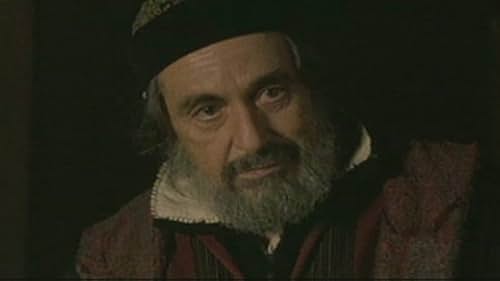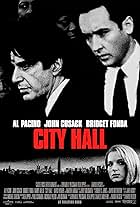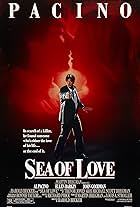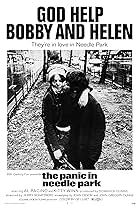In 16th century Venice, when a merchant must default on a large loan from an abused Jewish moneylender for a friend with romantic ambitions, the bitterly vengeful creditor demands a gruesome... Read allIn 16th century Venice, when a merchant must default on a large loan from an abused Jewish moneylender for a friend with romantic ambitions, the bitterly vengeful creditor demands a gruesome payment instead.In 16th century Venice, when a merchant must default on a large loan from an abused Jewish moneylender for a friend with romantic ambitions, the bitterly vengeful creditor demands a gruesome payment instead.
- Nominated for 1 BAFTA Award
- 2 wins & 7 nominations total
- Aragon
- (as Antonio Gil-Martinez)
- Director
- Writers
- All cast & crew
- Production, box office & more at IMDbPro
Storyline
Did you know
- TriviaThe bare-breasted prostitutes were not put in the film to make it more risqué, but rather to add a note of historical authenticity. Venetian law at the time required all prostitutes to bare their breasts because the Christian authorities were concerned about rampant homosexuality in their city.
- GoofsIn Venice in 1598 a woman with no head-dress and her hair flowing loose would be taken for a whore, yet this is how Portia frequently appears.
- Quotes
Shylock: I am a Jew! Hath not a Jew eyes? hath not a Jew hands, organs, dimensions, senses, affections, passions? Fed with the same food, hurt with the same weapons, subject to the same diseases, healed by the same means, warmed and cooled by the same winter and summer, as a Christian is? If you prick us, do we not bleed? if you tickle us, do we not laugh? if you poison us, do we not die? And if you wrong us, shall we not revenge? If we are like you in the rest, we will resemble you in that. If a Jew wrong a Christian, what is his humility? Revenge. If a Christian wrong a Jew, what should his sufferance be - by Christian example? Why, revenge. The villany you teach me, I will execute, and it shall go hard - but I will better the instruction.
- Crazy creditsPROLOGUE: "Intolerance of the Jews was a fact of 16th century life even in Venice, the most powerful and liberal city state in Europe."
"By law the Jews were forced to live in the old walled foundry or 'Geto' area of the city. After sundown the gate was locked and guarded by Christians."
"In the daytime any man leaving the ghetto had to wear a red hat to mark him as a Jew."
"The Jews were forbidden to own property. Thus, they practiced usury, the practice of lending money at interest. This was against Christian law."
"The sophisticated Venetians would turn a blind eye to it but for the religious fanatics, who hated the Jews, it was another matter . . . "
- ConnectionsFeatured in 'Merchant of Venice': Shakespeare Through the Lens (2005)
- SoundtracksWith Wand'ring Steps
Composed by Jocelyn Pook, Lyrics by John Milton
Arranged by Jocelyn Pook
Performed by Baroque Strings Quartet Ensemble, featuring solo vocals by Andreas Scholl
Harp: Siobhan Armstrong
Psaltery: Harvey Brough
Lute: Elizabeth Kenny
Published by Shylock Ltd / EMI Music Publishing Ltd
© 2004 Decca Music Group Limited
(p) Jocelyn Pook Ltd. /2004 Decca Music Group Limited
The reason for this neglect of the play may be connected with sensitivities about the play's alleged anti-Semitism, a subject which has been even more sensitive since the rise to power of the Nazis in 1933. (This may explain why all previous versions were made during the silent era; in 1908 or 1922 it would have been easier to portray Shylock as a straightforward villain than it would be today). Yet in my view the film is not anti-Semitic at all. It should be remembered that during Shakespeare's lifetime there was no settled Jewish community in England; the Jews had been expelled by Edward I in the late 13th century, and were not permitted to return until the time of Cromwell, some forty years after Shakespeare's death. As far as we know, Shakespeare never travelled abroad, so it seems quite possible that he himself never knew any Jews personally or experienced the effects of anti-Semitism at first hand. The play is not simply about the Jewish question, but is, among other things, an analysis of the corrosive effects of religious prejudice. It may, in fact, be a coded examination of the mutual antipathy between Catholics and Protestants in Tudor England (something of which Shakespeare certainly would have had first-hand experience) and an appeal for greater tolerance between them.
Then as now, traditional anti-Semitic stereotypes had always depicted Jews as avaricious, but Shylock's principal sin is not avarice; if it were, he would certainly have accepted Bassanio's offer to pay him six thousand ducats, twice the amount borrowed by Antonio. Rather, Shylock's besetting sin is anger, and the root of his anger is the way in which he and his fellow-Jews are treated by the Christians of Venice. Not only are Jews in general regarded as second-class citizens, but Jewish moneylenders such as Shylock are particular targets for abuse, even though the services they provide are necessary to the Venetian economy. The play shows the corrupting effects of prejudice. Not only do views of this sort corrupt the Christians who hold them, they can also corrupt the Jews who suffer abuse. Shylock's vindictiveness is out of all proportion to the wrongs he has suffered. By spitting on him and calling him a dog, Antonio behaves like a boorish bigot, but boorishness and bigotry are not generally regarded as crimes deserving of the death penalty. Moreover, Shylock seeks to revenge himself on Antonio not merely for the undoubted wrongs that Antonio has done towards him, but also for all the wrongs, real and imaginary, that he has suffered at the hands of the Christian community, such as his daughter's marriage to Lorenzo.
It is to the credit of the film's director, Michael Radford and of its star, Al Pacino, that they understand all these issues. Pacino's Shylock has, initially, a sort of angry dignity about him that gradually gives way to vindictive rage and finally, after his humiliation in the trial scene by Portia's reasoning, to pathos. We see clearly that he has been the instrument of his own destruction, but we can still sympathise with him. In my view, none of Pacino's performances that I have seen have ever equalled those he gave in the first two 'Godfather' films (not 'Scent of a Woman', for which he won an Oscar, and certainly not 'Godfather III'), but 'The Merchant of Venice is the one that comes closest to those benchmarks. The other acting performance that stood out was Lynn Collins's luminous Portia, speaking her lines with great clarity and simplicity and bringing out the intelligence and resourcefulness that make her character more than simply a romantic heroine. I was less impressed with Jeremy Irons's Antonio, who seemed too passive. Antonio is a complex character; part loyal friend, part melancholy contemplative, part religious bigot and part enterprising capitalist. Although Irons captured the first two of those aspects, it was difficult to envisage his Antonio either spitting on someone of a different faith or hazarding his all on risky trading ventures.
Radford's interpretation of the play was attacked by the film critic of the 'Daily Telegraph' who, although he admired Pacino's performance, disliked the period setting and argued that Shakespeare needs to be placed in a contemporary setting if it is to have 'relevance' for a modern audience, citing a recent stage production which set the action in Weimar Germany. I would disagree profoundly with this approach. The theatre and the cinema are quite different media and, while there have been some striking modernist approaches to Shakespeare in the cinema (Trevor Nunn's 'Twelfth Night' comes to mind), a traditionalist approach is often the best one. (I preferred, for example, Zeffirelli's 'Romeo and Juliet' to Baz Luhrmann's). The idea that we can only appreciate Shakespeare in a modern guise is sheer intellectual laziness; we are not prepared to make the effort to see our greatest writer in the context of the Elizabethan society that produced him, but rather prefer him dressed up as an ersatz twentieth-century man.
Radford's traditional approach not only enables us to appreciate that bigotry and vindictiveness are age-old, universal problems, but also makes for a visually striking film. In the play, the scenes set in Venice itself are characterised by turbulent action; those set in Portia's country house at Belmont are happier and more peaceful. In the film, the Venetian exterior scenes were shot on location against a backdrop of misty, wintry grey skies, similar to the look achieved in 'Don't Look Now'. The candlelit interiors, with faces brightly lit against a dark background, were reminiscent of the chiaroscuro effects of a Caravaggio painting; I suspect this was quite deliberate, as Caravaggio was a contemporary of Shakespeare. By contrast to dark or misty Venice, the Belmont scenes (shot in an enchanting Palladian villa on an island in a lake) were characterised by sunshine or peaceful moonlight.
This is one of the best Shakespeare adaptations of recent years; an intelligent and visually attractive look at a complex play. 8/10.
A couple of errors. We see a black swan on the water in front of Portia's house. These birds are natives of Australia and were not introduced to Europe until well after 1596, the date when the film is set. Also, the portrait of Portia in the leaden casket is painted in the style of the Florentine Botticelli, who was active about a century before that date. Lynn Collins may be reminiscent of a Botticelli beauty, but it seems unlikely that a late 16th century Venetian lady would have had herself painted in the manner of late 15th century Florence.
- JamesHitchcock
- Dec 15, 2004
- Permalink
Details
- Release date
- Countries of origin
- Official sites
- Languages
- Also known as
- William Shakespeare's The Merchant of Venice
- Filming locations
- Esch-sur-Alzette, Luxembourg(only Venice film set)
- Production companies
- See more company credits at IMDbPro
Box office
- Budget
- $30,000,000 (estimated)
- Gross US & Canada
- $3,765,585
- Opening weekend US & Canada
- $69,868
- Jan 2, 2005
- Gross worldwide
- $21,560,182
- Runtime2 hours 11 minutes
- Color
- Sound mix
- Aspect ratio
- 2.35 : 1
Contribute to this page











































